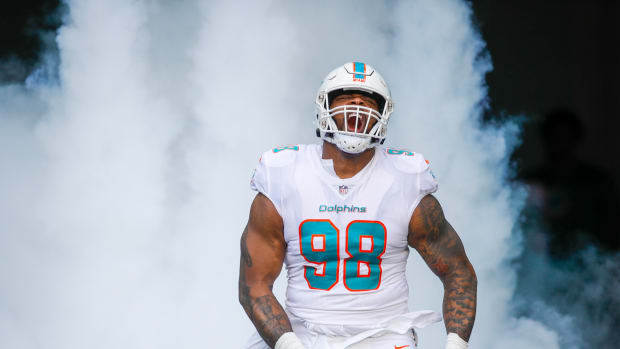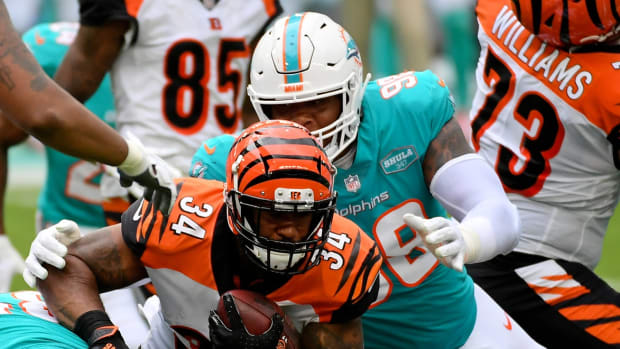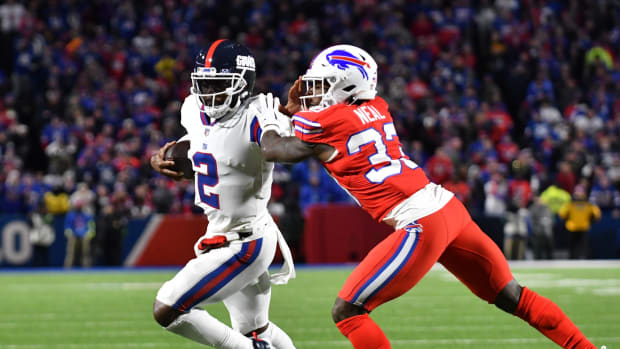Updated Dolphins Playoff Picture After Win at Las Vegas
The biggest significance of the Dolphins' wild 26-25 victory against the Las Vegas Raiders on Saturday night is that it allowed them to maintain full control of their playoff destiny.
The Dolphins don't have to worry about any of the 12 remaining games this weekend or any of the games that don't involve them in Week 17; all they have to do is win at Buffalo on Jan. 3 and they'll be back in the playoffs for the first time since 2016.
The Dolphins still could make the playoffs even if they lose at Buffalo, but it does get complicated.
At the start of Week 16, the Dolphins were tied with Baltimore at 9-5, one game behind Tennessee, Cleveland and Indianapolis.
Kansas City (13-1), Buffalo (11-3) and Pittsburgh (11-3) already have clinched playoff berths.
The assumption is that the Cleveland, Indianapolis and Tennessee all will finish 11-5 or better because they have games remaining against the Jets, Jaguars and Texans, respectively.
Which means the Dolphins' playoff hopes if they lose at Buffalo will come down to what happens with Baltimore. Under this two-team battle scenario:
-- If the Dolphins win at Buffalo in Week 17, they're in the playoffs.
-- If the Dolphins lose at Buffalo, they're in if the Cincinnati Bengals defeat Baltimore in Week 17, otherwise they're out. That means that for this two-team scenario, the Baltimore-Giants game in Week 16 is meaningless.
We explain, by first outlining the tiebreaking procedures for wild-card berths:
1. Head-to-head, if applicable
2. Best won-lost-tied percentage in games played within the conference
3. Best won-lost-tied percentage in common games, minimum of four
4. Strength of victory
5. Strength of schedule
If the Dolphins and Ravens both finish at 11-5, the first applicable tiebreaker of conference record would apply because Miami would end up 8-4 against AFC opponents to Baltimore's 7-5.
If the Dolphins and Ravens finish 10-6 with Baltimore's one victory coming against the Giants, the teams both would finish with 7-5 conference records. But the Dolphins would have a 2-2 record in common games (New England, Cincinnati and Kansas City) compared to Baltimore's 1-3.
If, however, Baltimore and the Dolphins finish 10-6 with Baltimore's victory coming against the Bengals, then they would match the 2-2 record in common games. That would move things over to strength of victory (combined winning percentage of teams defeated), where Baltimore has an insurmountable advantage at this point, .429 to .332.
Now, if we get other teams involved in a 10-6 scenario, let's break down the permutations.
The teams to watch here are Cleveland and Indianapolis, who each currently have a 6-4 conference record and therefore would fall to 6-6 by losing their final two games.
In three-way-tie scenarios involving the Dolphins and the Ravens at 10-6, Miami and Baltimore would be in if the third team involved was either Cleveland or Indianapolis, but the Dolphins would be left out in a scenario where the three 10-6 teams are Miami, Baltimore and Tennessee.
The Indianapolis-Pittsburgh game on Sunday could impact the Dolphins in more ways than one.
We've already mentioned the Colts, but the game also could have ramifications when it comes to the Dolphins' Week 17 opponents, the Bills.
If the Colts defeat the Steelers, Green Bay defeats Tennessee and the Bills defeat New England on Monday night, Buffalo will clinch the second seed in the AFC playoffs, therefore will have nothing at stake in terms of playoff positioning when they face the Dolphins.
Under that scenario, it's entirely possible the Bills choose to limit the playing time of some front-line players, if not entirely sit them out.




